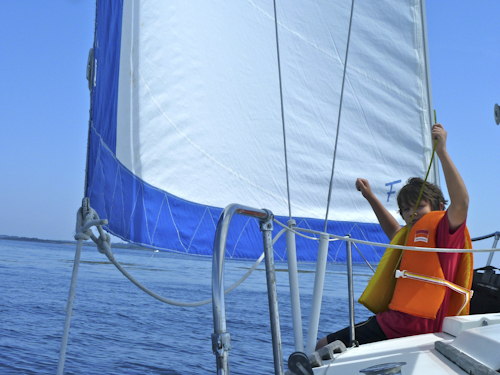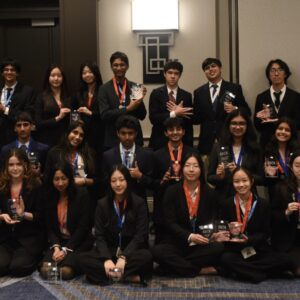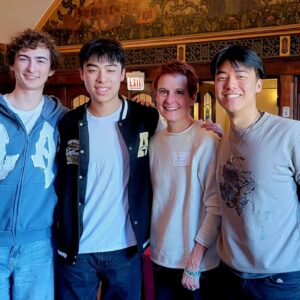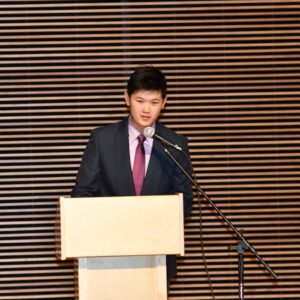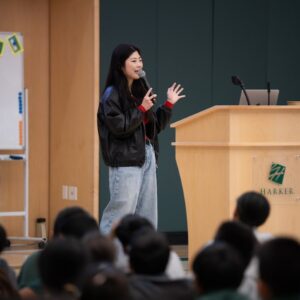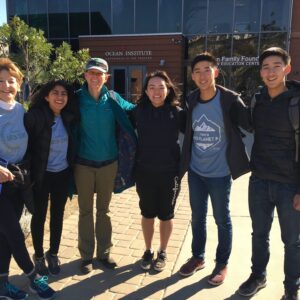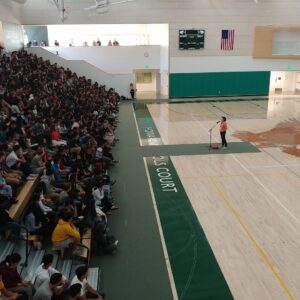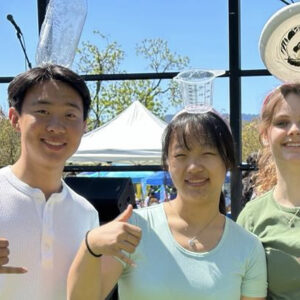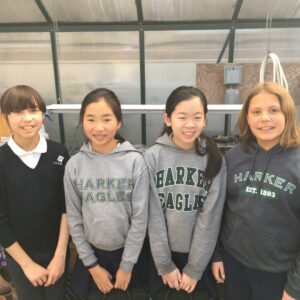What began as an interest in sailing morphed into a crusade to save the earth’s waterways from plastic pollution for Dolan Dworak, grade 7.
When 12-year-old Dworak enrolled in sailing lessons a couple years back he had no idea the classes would lead to his current volunteer efforts with the Sea Scavenger Conservancy, a nonprofit San Francisco-based organization working to rid our waterways of plastic pollution.
Looking back it seems almost fated that he took up sailing at San Francisco’s McCovey Cove, where he met and bonded with Sea Scavenger founder Lorraine Palmer, who would go onto become his mentor. Today, as the Junior “SeaEO” of Sea Scavenger, Dworak represents the organization as a spokesperson, educating fellow Harker classmates, speaking at scout troop, church, school and city council meetings, and even attending international marine biology conferences to spread the word about the dangers of petroleum, a byproduct of plastic waste infesting our oceans, seas and tributaries. He is also busy recruiting other Bay Area students to serve on Sea Scavenger’s junior board of directors and helps coordinate monthly shoreline clean-up efforts and publicity for the cause.
Last year he visited Harker’s lower school where he led an engaging presentation about his work with Sea Scavenger. He brought along an art project titled “The Picket Line: Protest Plastic Pollution” to show the younger students what he and several students from the middle school (along with art instructor Elizabeth Saltos) created with trash they picked up during a cleanup at a local beach tied to wooden pickets. “The Picket Line” will soon be displayed at multiple locations in the Bay Area.
Most recently, he used the summer break to travel the East Coast from Maine to Delaware where he continued his education in marine biology along diverse shorelines – urban industrial, rocky beaches on remote islands, high density sandy beaches near resorts – from small inlets to wide-open ocean. His greatest concern is the oceans and the sea life within.
All five of the world’s oceans contain gyres – massive islands of trash afloat off the coast – attributed to the overuse of plastic, which gets into waterways and oceans. In fact, millions of tons of plastic have accumulated and created the gyres. The plastic breaks down through wind, sun and wave action and the chemicals leach into the water – water that flows all over the world. Also, sea animals mistake the plastic for food, ingest it, are poisoned and die. Humans ingest the harmful chemicals through tainted water and seafood.
“Too much marine life is dying due to plastic pollution, and my generation can stop the problem and save the animals,” said Dworak.
Dolan’s mom, Susan, added, “We can’t stop using all plastics, of course, but we need to stop polluting the earth with wasteful, single-use, harmful plastics. We are overwhelming the earth and causing irreversible harm. There is hope. Every single person can make a difference every single day by reducing, reusing, replacing or refusing plastics. Every plastic bag. Every plastic water bottle. Every bit helps, and changes in lifestyle are easy to make.”
Founded in 2008, Sea Scavenger works to establish ongoing cleanup operations in the remote ocean gyres where great concentrations of plastic are accumulating. They also strive to develop new technologies for plastic extraction and seek innovative uses for recycled ocean plastics.
Dworak’s family donate their motor yacht to assist in a monthly shoreline cleanup effort along the Bay, which the entire Dworak family takes part in. Beyond removing harmful trash along the beaches, they collect it and sort it out by various types of plastic to determine its origin and work with its manufacturers to try and find alternatives to using plastic.
A highlight of Dworak’s volunteer efforts with Sea Scavenger was attending the fifth International Marine Debris Conference in Hawaii. He went there in his role as junior spokesperson for Sea Scavenger, accompanied by his mom. The event, held every 10 years, hosts 38 participating countries, and attracts a large number of participants, including hundreds of scientists. But Dworak had the distinction of being the only child there.
Next up on Dworak’s agenda is a trip in June of 2013 to Seward, Alaska, to participate in Gyre X, an international expedition led by the Alaska Sea Life Center. Dworak has been asked to serve as Gyre X’s youth social media coordinator. The expedition will include an array of scientists and artists who will study and collect marine debris from remote parts of Alaska that will later result in an exhibit sponsored by the Smithsonian Institution traveling to museums around the world.
“I hope to get more people involved and to increase awareness, because the less plastic we use means the quicker the problem is solved,” said Dworak.
Plastic pollution is a huge problem, but one that is not impossible to solve. Scientists are studying the environment. Industry is redesigning products. And organizations – like the one Dworak is involved in – are creating awareness.
